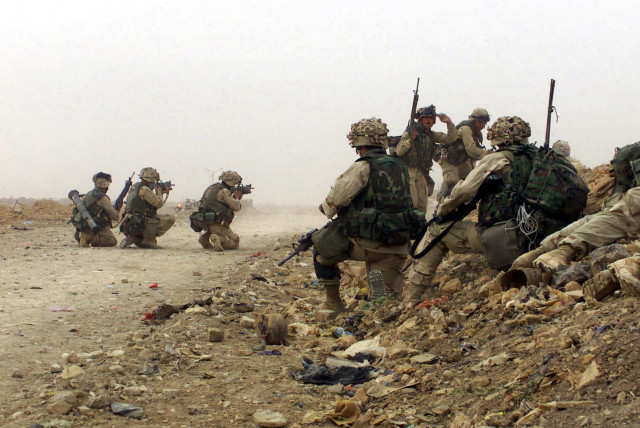Is the US losing its grip on the Middle East? - opinion

While Israel and Iran play a high-stakes game of "who will blink first," the real loser in this nerve-racking standoff might just be the United States.
For years, the US has worn the mantle of global peacekeeper and order enforcer. This belief has been so deeply ingrained in the American political narrative that it repeatedly propelled the US military into wars that had little to do with America itself, let alone any direct impact on the nation.
The most memorable of these is the ill-fated Vietnam War, which stretched over 20 years, from 1955 to 1975. It pitted communist North Vietnam, backed by the Soviet Union and China, against South Vietnam and the United States.
Driven by a hysterical fear of communist expansion in Southeast Asia, the US entered a war that wasn’t its own, losing an unimaginable number of soldiers—no fewer than 58,220.
After two decades of brutal fighting and growing public opposition, the US finally agreed to withdraw all its forces. Later that same year, Congress went a step further, banning all American military operations in Indochina.
Going back 38 years before that to 1917, when the US was dragged into World War I. This time, the outcome was different: the US emerged victorious after entering the conflict three years after it had begun.
The pattern repeated itself over the years, with the US intervening in numerous other wars and conflicts, including the First Gulf War in 1990, following Iraq's invasion of Kuwait, and the Iraq War in 2003, aimed at toppling Saddam Hussein’s regime, which ultimately led to an enduring insurgency.
This is American power at work—one of the defining traits that have positioned the US as the world’s superpower responsible for maintaining global order or, at the very least, minimizing damage. When tensions between nations escalate, the US typically steps in, rolls up its sleeves, intervenes quickly, and tries to exit just as fast, with minimal losses. And it excels at this—perhaps better than any other nation.
But what happens when there’s a "pseudo-war," like the current situation between Iran and Israel? What is the US supposed to do when there’s a prolonged, ominous tension, yet no one pulls the trigger? This limbo leaves the US with no clear avenue for intervention to assert its dominance. Worse still, it suggests that Washington may no longer be the decisive power it once was in the Middle East.
The critical question is: Is the US losing its grip on the Middle East?
Last month, on July 31, mere hours after Hamas leader Ismail Haniyeh was reportedly killed in an Israeli operation in Tehran, US Secretary of State Antony J. Blinken admitted that the US had neither been involved nor aware of the operation beforehand.
This statement, to many, symbolized a loss of control over the increasingly complex and volatile relationship between Iran and Israel. It raised serious questions about the political, economic, and security ramifications of this reality.
When Israel acts independently, without coordination or prior notice to Washington, it is a sign that the dynamics have shifted. American foreign policy, once grounded in influence and diplomacy, now appears weaker—encouraging other regional players to act autonomously and destabilize the political landscape. Above all, this might signal a clear erosion of the US's diplomatic standing as the primary broker in critical geopolitical conflicts.
The recent developments also raise doubts about the reliability of the intelligence the US receives from its allies, particularly Israel, despite the strong and enduring ties between the two nations.
Economic and Security Implications of America's Waning Influence in the Middle East
The potential loss of US control over the critical Israel-Iran conflict could have dramatic consequences for the global economy, especially in energy markets. Recent events highlight the importance of political stability in the region, which directly impacts energy prices, stock markets, and the global economy.
On the security front, Israel’s push for autonomy in its military actions in the Middle East presents significant challenges for the US It may find itself facing an unexpected escalation or a full-scale conflict between the two nations.
The volatile security situation in the Middle East also forces the US to protect its strategic interests in the region. Should Iran respond more aggressively to Israeli military operations, the US could find itself compelled to intervene militarily or diplomatically to prevent a broader conflict.
These economic and security implications underscore the urgent need for the US to develop new diplomatic and security strategies to maintain its influence and regional stability. Such strategies must be tailored to the "Balance of horror" scenario—before an all-out war erupts.
This Balance of horror is a novel, unfamiliar situation. It pushes tensions to their peak, wearing down nations, citizens, businesses, and markets. And it has already lasted far too long.
The American solution in this scenario will be strategically and diplomatically complex— no easy fix. But one thing is for sure: it will equip the US with additional and more flexible tools in its intervention strategy, tools that can be used in the future for various intermediate scenarios, balancing between uneasy peace and explosive conflict.
So maybe it's time for the decision-makers in the American government to act according to the quantum theory principles and "open" the door of the box (The Middle East) in order to determine the final state of the cat (represents Israel and Iran)?!
Jerusalem Post Store
`; document.getElementById("linkPremium").innerHTML = cont; var divWithLink = document.getElementById("premium-link"); if (divWithLink !== null && divWithLink !== 'undefined') { divWithLink.style.border = "solid 1px #cb0f3e"; divWithLink.style.textAlign = "center"; divWithLink.style.marginBottom = "15px"; divWithLink.style.marginTop = "15px"; divWithLink.style.width = "100%"; divWithLink.style.backgroundColor = "#122952"; divWithLink.style.color = "#ffffff"; divWithLink.style.lineHeight = "1.5"; } } (function (v, i) { });

